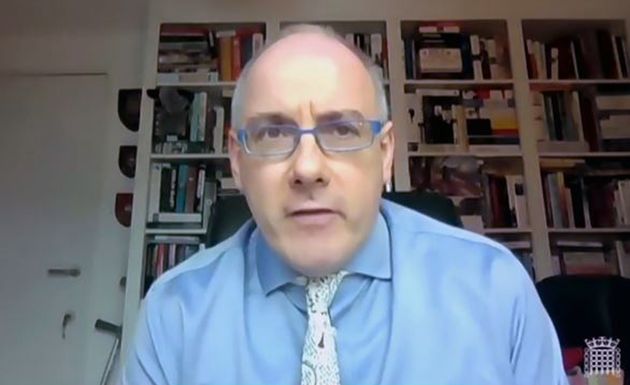More schools should be able to run Asian-style isolation systems for Covid contacts to ensure fewer people are sent home, a senior Tory has said.
Rob Halfon, who chairs the Commons education committee, suggested that official guidance for schools could be cleared up to allow targeted approaches, rather than forcing whole school “bubbles” to go into isolation if there is a virus case.
With around 385,000 pupils in England absent from school as a result of Covid, Halfon stressed: “We are damaging their mental health”.
The government has suggested it will scrap so-called “bubbles” of schoolchildren, who often all have to isolate if one catches Covid, from autumn.
But Boris Johnson is resisting pressure to move quicker, insisting summer holidays would act as a “natural firebreak” to infections.
Halfon spoke to HuffPost UK’s Commons People podcast during a visit to the Ashcroft Technology Academy in south London, which he said was running a much more targeted Asian style model of isolation.
“When they have a Covid outbreak they do not send the whole school year groups or whole bubbles home,” Halfon said.
“They microtarget the students who have been affected, so they only send a few [home] at a time, a bit like the Asian model in some ways, what goes on in South Korea and so on.
“When I asked them how come you do this, they said they speak to Public Health England, they speak to the Department for Education every time there is such an outbreak and they are advised that they are able to do this.
“So if they are, why are 385,000 kids being sent home?
“I appreciate of course it is very difficult for teachers and support staff absolutely and they are doing a remarkable job considering.
“But clearly the guidance is confusing and schools may be being told different things by different arms of PHE or the DfE.”
House of Commons/PA
Halfon acknowledged that it would be difficult to roll out a similar system across the whole country.
But he said it would be beneficial if more pupils could benefit from the approach.
“Obviously there’s very different circumstances in some schools, the outbreaks may be greater, they may have many staff off sick for Covid or for Covid-related reasons or shielding, so I get that it’s not possible to replicate it.
“But if one school can do it, there must be others who can do it.
“It doesn’t mean every school can do it, but just because every school can’t do it doesn’t mean that… even if five more schools did it.
“It’s got to stop, sending kids home.
“We are damaging their mental health.”
Halfon added: “We are damaging these children by [them] being at home because inevitably they are not learning as much as they would do at school.
“But their wellbeing and mental health is really suffering and it’s putting huge pressure on the parents.
“This has just got to stop, we need our kids back into school.
“People have been vaccinated now, I’m not a lockdown-sceptic, I’m a ‘schooldown-sceptic’.”
Asked why the government did not just scrap the bubble system now, the prime minister told reporters on Thursday: “I understand people’s frustration when whole classes, whole bubbles, are sent home and people are asked to isolate.
“So what’s happening now is Public Health England and the scientists are looking at the advantages, the possibilities, of going to testing rather than isolation.
“They haven’t concluded yet so what I want to do is just to be cautious as we go forward to that natural firebreak of the summer holidays when the risk in schools will greatly diminish and just ask people to be a little bit patient.”






